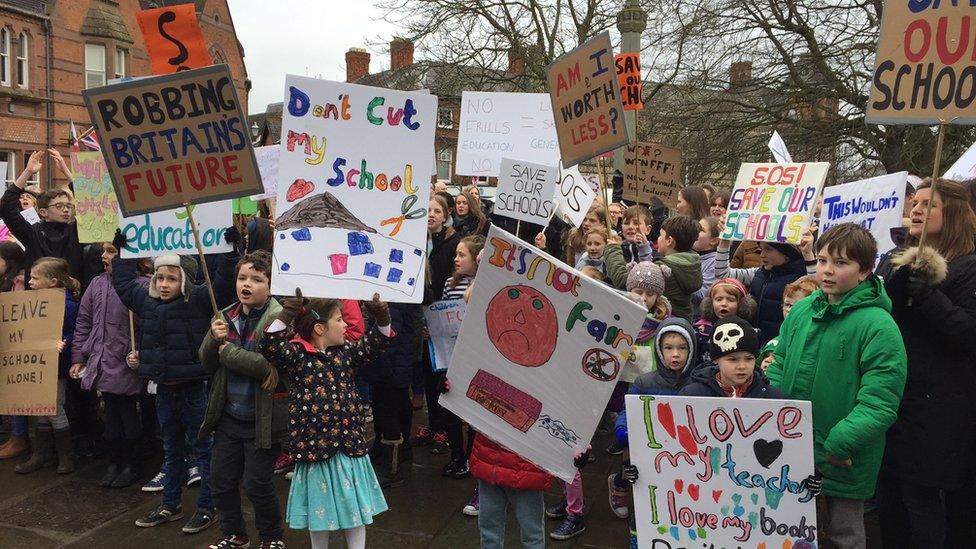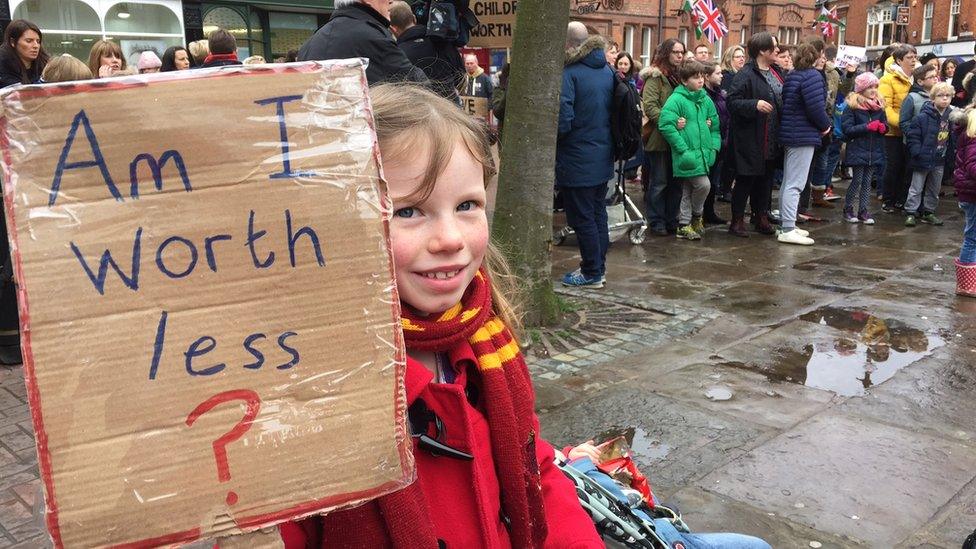School funding plans spark passionate protests
- Published

Nantwich isn't the kind of place that sees many demos.
On Monday morning, on a bitterly cold, damp day, more than 300 people gathered in the town's square to protest about school funding.
Most were parents who turned up with their children and homemade banners.
"Am I worth less?" read one damp cardboard placard clasped by a small girl.
The parents I spoke to told me they wanted an amount spent on their children's education similar to that in other areas around the country.
Until recently, many weren't aware this area was one of the lowest funded for schools.
The protest in Nantwich shows just how politically difficult it is for ministers to embark on the biggest shake-up of school funding in England for a generation.
There are limits to how much any school can gain or lose in the first couple of years - but that's barely taking the edge off the campaigns and protests bubbling up in areas such as this.

Nantwich is in the relatively affluent local authority of East Cheshire, a low-funded area where many schools hoped to do slightly better under a new formula.
As it turns out, some will get less in cash terms if the changes go ahead, because the new formula looks at deprivation at a local council area level.
Feeling poorer
Not far away is Crewe, also in East Cheshire.
It is a poor town where schools have coped with a growing number of children whose parents have moved from Poland and Slovakia.
Like other schools across England, Sir Thomas More academy in Crewe will have to find money for extra pay, pensions and national insurance costs in the next few years.
Despite school funding being at record levels, the bills are going up, so in real terms schools are feeling poorer.
Head teacher Clare Hogg, tells me the combined effect in the next couple of years of the background financial pressures and the new funding formula will be a hole in her budget of £450,000 - roughly equivalent to 11 staff.
The noise here is being echoed in some other counties, where every councillor is up for election in May and many of them are Conservative.
Cheshire East has four Conservative MPs, who are all being lobbied intensely by their local parents and schools.
As the Institute for Fiscal studies points out, this is also the first time schools in England have faced a real-terms funding squeeze for 20 years.
Whether your local school is starting from the top of the funding pile or the bottom just depends on where you live.
There is no easy solution, as it is the big cities that have received the most money over the past few decades.
That is in recognition of some of the intense poverty and social challenges that exist within them.
The new formula proposed would see cities such as Liverpool, Manchester, Nottingham and Leeds losing, as some money is shifted towards counties such as Lincolnshire and Somerset.
London is a big loser too, but starting from some of the highest levels of funding.
The Core Cities Group, which speaks for big urban areas outside London, has already expressed concerns about the effect on schools.
But there are no local elections in the cities this year.
The political pressure from the counties may lead the government to tweak some of the finer details of the planned formula.
The Education Secretary for England, Justine Greening, has been having a series of regional meetings with MPs, so she will be in no doubt that some are unhappy.
Against the background pressures of funding per pupil going down, this was never going to be an easy ride.
And after decades of campaigning for change, the counties also fear destroying the best chance they've had of getting some redistribution of money from the cities.